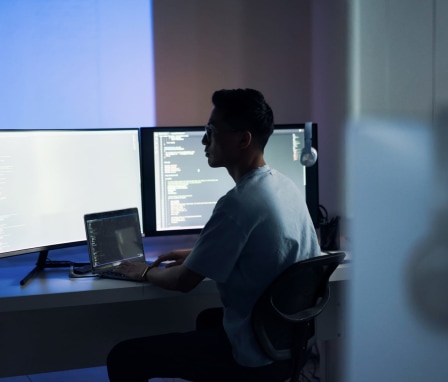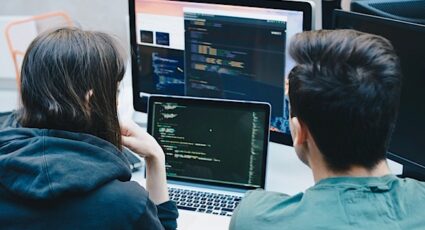 Credit: pixdeluxe / E+ / Getty Images
Credit: pixdeluxe / E+ / Getty Images
Do you want to join a workforce that stands at roughly 1.2 million professionals? The United States employs the most cybersecurity professionals in the world, with a global workforce numbering 4.6 million, according to a 2022 Statista Research Department report.
The cybersecurity sector continues to boom, with a demand for security software developers who can create programming to combat modern cybersecurity threats. For their work, security software developers make on average six figures.
Pay and responsibilities vary depending on if you work in information, finance and insurance, management companies, computer systems design, and administration and support services.
Security software developers have different duties for their various work settings. This guide provides an inside glimpse into a typical day of a security software developer.
What Is a Security Software Developer?
Cybersecurity's history dates back to the 1970s when Ray Tomlinson developed Reaper, which is widely known as the first antivirus software developed to fight the Creeper virus.
Antivirus programming quickly developed to keep up with the widespread use of the Internet. Today, the worldwide cybersecurity industry is worth $173.5 billion in 2022, and projected to increase to $266.2 billion through 2027.
It should be no surprise in today's digital world that companies need security software developers, also called security developers or cybersecurity developers, to keep data private and secure systems.
No matter their title, security software developers work across different departments to create software solutions that promote security policies and standards. This work differs from information security analysts who install software to protect computer networks.
Popular Online Programs
Learn about start dates, transferring credits, availability of financial aid, and more by contacting the universities below.
What Does a Security Software Developer Do?
What does a security software developer do daily? Security software developers design software to safeguard companies from data breaches, cyberattacks, and viruses. This may include developing traffic analysis, and intrusion and malware detection.
It can be a challenge to work in the deadline-driven atmosphere of software development. Security software developers may feel rushed to release software before the proper check and balances occur.
That said, if you have a strong background in computer programming and excellent analytical skills, you have what it takes to excel as a security software developer. With enough experience and education, you can advance from an entry-level position to a senior career in management. Although not a comprehensive list, your key duties will likely include what's noted below.
Main Duties of Security Software Developers
-
Develop Security Software: Security software developers create and maintain security controls and processes. This requires complying with the software development best practices to implement processes and methodologies, conduct code reviews, and test products. Security software developers use the latest cybersecurity techniques to protect applications, systems, and data from hackers. Throughout the software developer lifecycle, they often work alongside security teams that include other engineers, data analysts and developers. -
Implement Security Upgrades and Updates: By meeting with business stakeholders and people across departments, security software developers can learn of potential vulnerabilities to systems and products. This intel helps them recommend security protocols and architecture, and implement encryption and decryption algorithms. -
Stay On-Trend: The world of cybersecurity requires continuous learning. Security software developers must keep up to date on cybersecurity trends, technology, and regulatory changes. With every new virus, security software developers adjust their recommendations. -
Computer Systems Maintenance: Security software developers routinely research vulnerabilities in applications, systems, and cloud infrastructure to determine the best mitigation efforts. This requires that they perform vulnerability scanning and penetration testing to access any risks and vulnerabilities. They must be familiar with automated and manual security assessment techniques. -
Manage Security Teams: Senior security software developers manage teams of other engineers and developers to plan and prioritize security improvements.
Nonstandard Duties for Security Software Developers
-
Maintain Industry Presence: While not a typical job requirement, companies sometimes encourage security software developers to write technical papers and or have open-source contributions. Also, security software developers may participate in panel talks on cybersecurity at community events or conferences, where they can share their passion for their work. -
Professional Development: Security software developers sometimes lead professional in-house development workshops or speak on panels at industry events. They may also mentor less-experienced engineers. -
Provide Project Management: At companies that do not have assigned project managers, security software developers lead teams to complete projects. -
Specialty Industry Knowledge: Software security developers often need specialized knowledge to work in certain sectors. For instance, software security developers may need to understand finance or cryptocurrency.
The Day to Day of a Security Software Developer
What you do each day as a security software developer depends on your employer. This schedule serves as an example of a typical day of a security software developer.
Keep in mind that the sector, size of the company, and your seniority influence your actual duties and schedule.
- 9 a.m.: Start your day, possibly with your beverage of choice. Turn on your monitors and check emails.
- 9:30 a.m.: Set your daily goals.
- 10:00 a.m.: Attend a video call with security teams to review, prioritize, and implement security solutions.
- 10:30 a.m.: Write code for vulnerabilities. Manage code releases. Implement countermeasures using industry solutions.
- 11 a.m.: Meet with stakeholders, developers, program management and marketing teams to scope solutions and understand your company's security needs.
- 11:30 a.m.: Oversee improvements and troubleshoot problems. Get real-time feedback from your peers.
- 12 p.m.: Catch up on industry news and trends.
- 12:30 p.m.: Grab lunch with coworkers at the nearby food truck.
- 1:30 p.m.: Handle email correspondence and respond to any phone calls.
- 2 p.m.: Resolve technical issues and implement solutions to minimize the chance of it happening again.
- 3 p.m.: Mentor any up-and-coming teammates.
- 4 p.m.: Monitor and maintain computer networks, looking out for potential risks.
- 5 p.m.: Take a deep breath and clock out.
Where Security Software Developers Work
Various industries need software developers who can create security measures during the software development process. Security software developers often earn more working in the private sector versus public companies.
That said, government agencies have a greater need for cybersecurity. Employers hire security software developers to work in:
- Education
- Fortune 500 Companies
- Technology
- Fiance
- Healthcare
- Media
- Start-Ups
Security software developer jobs vary by industry and location. States and cities that have initiatives to increase cybersecurity may have more job opportunities for developers in the public sector. Metropolitan areas with greater a concentration of finance or Fortune 500 companies, often also need more security software developers.
Where you work — what sector and region —influences your job responsibilities and pay. California compensates software developers the best, with an average annual wage of $182,570, according to the Bureau of Labor Statistics.
California also has the highest employment level of software developers, while Washington, D.C., New York, and Los Angeles have some of the highest demand for security software developers.
According to research from Electric, the states with the highest need for cybersecurity talent were Florida and Georgia, specifically in Miami, Orlando, and Atlanta.
Popular Online Programs
Learn about start dates, transferring credits, availability of financial aid, and more by contacting the universities below.
How to Prepare for a Career as a Security Software Developer
Everyone’s path to become a security software developer looks different, but in every scenario you need to complete education and training to gain computer programming and cybersecurity skills. Many security software developers earn a bachelor’s degree in computer science or a related major. Others get their education from cybersecurity bootcamps.
Online security software developers can pursue a four-year computer science degree. Software security certifications offered through professional organizations and colleges give you the specialized software security skills.
Internships can provide you with additional experience to land your first entry-level job. The pursuit of a software security career requires perseverance, especially during the education phase and on the job when tasks get repetitive.
If you are juggling a career or family life, look for a program that offers convenience. For example, part-time programs or online degrees provide more flexibility to study on your own time.
Professional Spotlight: Vikram Bodicherla: Staff Software Engineer, WhatsApp
1. What's a typical day like for you?
I am usually involved in a couple of large projects at any point – some exploratory based on some threats or proposed product changes, some in design phase and some in execution. I’d like to keep them balanced in a 10%-20%-70% configuration as much as possible.
A typical day consists of about 1-2 hours of scheduled meetings to understand various features, designing threat models and preemptive solutions. I spend about 2-3 hours in ad-hoc conversations with my team members on brainstorming, discussing ideas and reviewing RFCs (we capture all ideas and proposals as an RFC or a Request For Comment which is used to provide feedback).
I spend around 3-4 hours in heads down work: Writing and reviewing code and RFCs. This is when I usually go silent and off the grid.
I also spend around 30 minutes per day supporting my team with their questions, providing mentorship and other ad-hoc things like project planning and management.
2. What other teams do you work with on a regular basis?
I have three sides to my interactions: Various engineering teams (front-end, back-end, applications) which are building features and functionality for the end-user, research engineers and cryptographers which are building new privacy and security systems and legal, policy and regulatory teams which help us understand our obligations and formulate our commitments to our end-users and regulators.
I also work with our leadership teams to help define our goals and deliverables and provide updates on progress.
3. Is there a lot of collaboration in your role? Or is it mostly independent work?
Security and privacy engineering is inherently a very collaborative field. You are working with all your partners to understand, assess and design security solutions. You are almost always working to secure stuff built by someone else, so it’s very important to work with them to retain the context and value proposition of the product and not let security and privacy protections come in the way.
That’s not to say that there isn’t a heads down part to it – once you understand the problem space for a certain product, you are heads down devising the threat model and devising solutions.
4. Do you work in an office or from home (or a hybrid)?
I work in a hybrid setup, three days at work and two days from home. My work days are usually heavy on collaboration while the home days are heads-down days.
5. What's your favorite part of being a security software developer? The most challenging part?
My favorite part is the satisfaction that we are contributing towards a safer experience for all the Internet users (it’s probably the closest that I’ll ever feel to how a cop probably feels towards their community). The space is also very exciting; trying to find weaknesses and creatively seal them before the bad guys get to them is a lot of fun. There are some wonderful upcoming challenges – like the rapid adoption of Generative AI and Quantum Computing – a decade down the line.
The most challenging part is the true vastness of the space. There’s no start or end to this, it’s really about how creative you can get about the various threats out there, how well you can assess the possible impact of them and how effectively you can implement a practical solution in a holistic way. You are learning and adapting every minute of your journey. There’s no one-size-fits-all. Which is also what makes it fun!
6. Any other insights about your day-to-day tasks as a security software developer that may help people considering this career path?
First and foremost, this is a super relevant field, and [it] is growing by the day. With the explosion of private user data being plugged into all online systems, it’s more important than ever to secure these systems and many companies are investing heavily in the space. Users today are very sensitive to where and how their data is used. There will be an explosion of importance in this field as more users interface with the Internet in more ways: smart home devices, AI bots, self-driving cars and more. In many smaller companies, you might end up becoming an SME sooner than a regular software developer since there aren’t usually as many security engineers.
I find security and privacy engineering to be a good mix of social, psychological, financial, legal, regulatory and technical aspects coming together. As you advance through this field, you will slowly build a good appreciation of how all these factors playout in the digital world today.
The flipside is that you often don’t build features you can show your friend. You are going against the stream a little bit, asking teams to slow down and think about privacy and safety of their system.
7. For whom do you think this career is a good fit? Why?
Anyone who’s motivated by the problems in the space of privacy and security, is technical, collaborative, and is willing to learn and iterate is a good first candidate. Then ask yourself the following questions
- Would you be okay not being the one building fancy new features, but instead being the one asking them to slow down and think about safety and privacy?
- Can you bring a protectionist mindset to your job? And obsess over your users' rights and protections? Will you be comfortable taking a stand for your users' safety?
- Will you enjoy being a part of a lot of conversations as a safety and privacy consultant instead of focusing on a few problem spaces for a long time?
- Will you enjoy working with legal, policy and regulatory teams on the product and its privacy and security provisions? Will you be interested in getting comfortable understanding and appreciating various laws and provisions across the world?
- Will you be interested in proactively learning from external and internal resources and mentors? I believe that there’s a lot more self-learning for a security and privacy engineer than in traditional software engineering roles.
If you are not sure, take a few online classes, try out a project or two at work, and mentally play out the role of a security engineer and hopefully you will know!
Vikram Bodicherla is a staff engineer at Meta focusing on privacy. He has worked on various Meta products including secure storage for Facebook Messenger and Instagram and core security and privacy components at WhatsApp.
Prior to Meta, over his career of more than 14 years, Vikram has led teams across many large products, including Uber and Yahoo Finance. Vikram has a MS in computer science from UC Irvine and a BE (Hons) computer science from BITS Pilani, India.
"There’s no start or end to this, it’s really about how creative you can get about the various threats out there."
Learn More About Security Software Developers




FAQ About the Daily Tasks of Security Software Developers
What does a security software developer do daily?
Security software developers create privacy and security solutions. Their duties and responsibilities vary by setting. Basically, a security software developer’s day consists of monitoring and investigating common vulnerabilities and exposures. In this role, security software developers create development strategies by teaming up with security and development teams to address potential risks and vulnerabilities.
Is the day in the life of a security software specialist the same for a software developer?
No. While both roles work to stay ahead of any cyberattacks, a security software specialist plans and implements security measures and solutions, while security software developers build the safeguards and set coding standards.
What skill sets do cybersecurity software developers have?
Cybersecurity software developers know how to code using programming languages like C++, Python, and Java. They also have strong organizational skills to roadmap the software development life cycle. And cybersecurity developers have excellent communication skills to work across all departments and with stakeholders.
Are software developers and security software developers doing the same job?
Software developers and security software developers are engineers who have a passion for programming. The two occupations code and test programs, and manage and develop systems and programs. However, security software developers focus on security measures.
Source list
- Cybersecurity Market. (n.d.). Markets and Markets
- Size of cybersecurity workforce worldwide in 2022 by country. (2023). Statista
- Software developers: Occupational Employment and Wage Statistics. (2022). U.S. Bureau of Labor Statistics
- Terekhov, Anton. (n.d.). History of the antivirus. Hotspot Shield
- The big quit: Why cybersecurity pros are leaving government. (2021). Tanium
- Where in the U.S. can IT workers make the most money? (2023). Electric
Recommended Reading
View hand-picked degree programs
Tell us what you’d like to specialize in, and discover which schools offer a degree program that can help you make an impact on the world.

 Edited by
Edited by